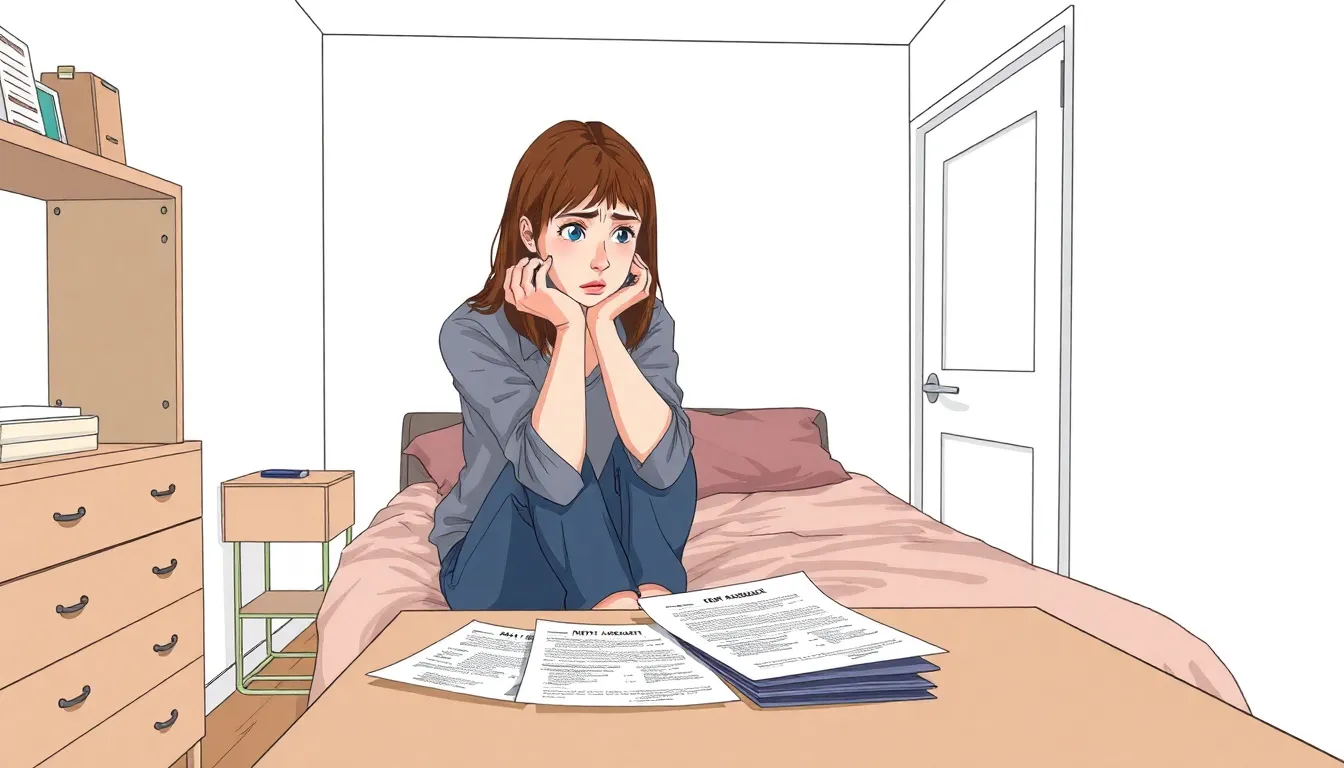Table of Contents
ToggleRenting might seem like the golden ticket to freedom, but it often comes with a few hidden gremlins that can haunt even the most optimistic tenant. Sure, the idea of not being tied down to a mortgage sounds appealing, but what happens when the landlord decides to raise the rent or, worse, sells the property out from under you? Suddenly that carefree lifestyle starts to feel a bit like a game of musical chairs—except there’s no music and you’re left standing.
Then there’s the joy of living under someone else’s rules. Want to paint the living room a vibrant shade of avocado? Too bad! You’ll have to settle for the landlord’s bland beige. Renting can feel like being a guest in someone else’s home, complete with a long list of restrictions. So before diving headfirst into the rental market, it’s worth considering the not-so-glamorous side of renting that could leave you feeling a bit cramped.
Overview of Renting Disadvantages
Renting offers flexibility, but it comes with notable disadvantages. Uncertainty often looms over rent increases. Landlords may decide to sell properties, disrupting tenants’ lives unexpectedly. Limitations on personalizing living spaces arise frequently, making rented homes feel less like personal sanctuaries. Rules established by landlords can limit tenants’ abilities to express themselves in their living environments.
Security deposits add another layer of concern. Tenants may face difficulties in retrieving these deposits due to vague terms or landlord disputes. Long-term financial implications also exist, as rental payments do not build equity over time. Financial responsibility does not translate to ownership, leaving renters without long-term investment benefits.
Lease agreements can restrict essential freedoms. Subleasing or making modifications often requires landlord approval, complicating what should be a straightforward living experience. Maintenance issues may arise as well, and renters might depend on landlords for timely repairs, which can delay resolutions.
Restrictions in a rental agreement can further diminish the feeling of home. Pets may not be allowed, leaving pet owners with limited housing options. Noise limitations and stricter policies on guest visits can lead to feelings of confinement. Social interactions may diminish due to these constraints, impacting renters’ overall quality of life.
Understanding these disadvantages is crucial before entering a rental agreement. The lack of long-term commitment may seem appealing, yet it’s essential to weigh the long-term impact and limitations that rental living entails. These factors contribute to a less-than-ideal living situation, making homeownership a preferred long-term goal for many.
Financial Implications

Renting poses various financial challenges that can impact renters significantly. Costs associated with renting often outweigh the perceived benefits.
High Monthly Payments
Monthly rent can frequently exceed mortgage payments in many markets. Consistent rent obligations drain monthly budgets, restricting savings and investments. Renters might face annual increases, leading to further financial strain. Many landlords impose additional fees, such as late charges or maintenance costs, which add to living expenses. Decisions often require renters to prioritize basic needs over personal desires, limiting flexibility in financial planning.
Lack of Equity Buildup
Rental payments contribute to landlords’ wealth, but don’t provide renters with any equity. Ongoing monthly payments foster frustration when renters realize they build no ownership over time. Unlike homeowners, who can appreciate property values, renters miss out on potential long-term gains. Not accumulating equity limits wealth-building opportunities, hindering financial security. Tenants may find these dynamics disheartening, as financial investments are often tied to stability and future security.
Limited Control Over Living Space
Renting comes with significant limitations on personal space and customization. Tenants often find themselves living under strict rules set by landlords.
Restrictions on Modifications
Landlords frequently impose regulations on any changes tenants wish to make. Painting walls or reorganizing layouts may not be allowed. Decorating with personal touches can prove difficult as many leases restrict modifications. No matter how small the changes, tenant approval is usually required. This lack of flexibility stifles creativity and personalization. Consequently, renters may feel less ownership in their living environment.
Issues with Landlords
Landlord responsiveness varies widely, creating potential headaches for tenants. Some landlords may delay repairs or maintenance requests, leading to unsafe living conditions. Renters often depend on landlords for basic upkeep, which can result in frustration. Communication gaps may also hinder timely resolutions. If a property owner neglects responsibilities, tenants may endure discomfort for extended periods. These challenges can make renting feel more like an obligation than a home, ultimately impacting renters’ quality of life.
Stability and Security Concerns
Renting often comes with significant instability and security issues that impact renters’ peace of mind.
Risk of Eviction
Eviction poses a serious threat to renters. Landlords can terminate leases for multiple reasons, including late payments or property changes. Tenants facing eviction may experience significant stress, resulting in unplanned relocations. Such uncertainty disrupts daily life and affects work and social commitments. Furthermore, the inability to control one’s housing situation can lead to financial instability, especially if a sudden move is required. Without the legal protections that homeowners enjoy, renters can feel vulnerable. This insecurity influences long-term planning and resource management, as unexpected evictions can drain savings.
Unpredictable Rent Increases
Unpredictable rent increases can strain renters’ budgets. Many landlords adjust rental rates annually, often exceeding local inflation rates. Tenants may find their housing costs rising abruptly, impacting overall financial stability. Without regulations, these sudden spikes can force renters to make difficult decisions about their living situations. As expenses increase, finding affordable housing becomes more challenging, limiting options for the relocation. Rental agreements might not guarantee stable payments over time, which can lead to feelings of uncertainty. Consequently, the risk of financial strain serves as a reminder of the inherent instability of rental arrangements.
Lifestyle Limitations
Renters often encounter various lifestyle limitations that affect their daily experiences. Restrictions on personal choices impose significant constraints on living situations.
Restrictions on Pets
Pet policies frequently hinder animal lovers. Many landlords prohibit pets or impose strict breed or size limitations. Some may charge additional fees or impose non-refundable deposits. This can discourage responsible pet ownership and create challenges for families wanting furry companions. Finding a rental that accommodates pets requires more effort, limiting options and adding stress to the search process.
Limited Space and Amenities
Limited space often affects renters’ quality of life. Smaller living areas restrict personal belongings, impacting comfort and functionality. Shared amenities, including laundry facilities and recreation spaces, might not meet individual preferences. Some apartments lack essential features such as adequate storage or outdoor space, further complicating daily living. Navigating these constraints can lead to feelings of frustration, particularly for those accustomed to larger or more versatile environments.
Renting may offer flexibility but it comes with a host of disadvantages that can significantly impact one’s quality of life. The unpredictability of rent increases and the potential for eviction create a sense of instability that many find stressful. Limitations on personalizing living spaces and the lack of equity buildup can make renting feel more like an obligation than a true home.
Moreover the financial strain of rising rental costs can hinder savings and long-term financial goals. Understanding these challenges is essential for anyone considering renting as a housing option. While it might seem appealing at first glance the long-term implications often lead individuals to reconsider the benefits of homeownership.







